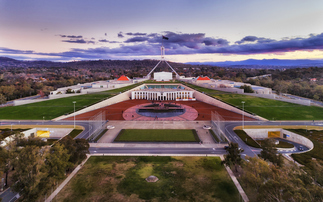Climate negotiators spent another day working behind closed doors in an effort to finalise draft decisions for ministers to consider and (hopefully) adopt by the end of the week.
With officials out of sight and the absence of any public dramas (a sharp contrast to Copenhagen), an outward image of productivity and calmness has seemed to exist at the conference centre. Scratch beneath the surface, however, and it is clear that key divisions remain unbridged across many of the core negotiation issues.
Awareness of this reality was clearly on the minds of key figures as the high-level segment of the conference was formally opened today. UN Secretary General Ban Ki-Moon, Mexican President Filipe Calderon, and UN climate chief Christiana Figueres, all stressed the need for compromise. The Secretary General noted that business-as-usual could not be tolerated any longer and that action was needed not just for environmental reasons but also to address poverty and ensure global security. Both Calderon and Figueres underlined that the future of the multilateral process was at stake in Cancun, with Figueres telling parties they needed to offer compromise, not simply seek it from others. Heads of state from a number of small Pacific island countries wrapped up the ceremony with frank and unsentimental arguments about why ambitious action was so crucial to their countries.
All roads lead to Kyoto
As expected it is the fate of the Kyoto Protocol that appears to be emerging as the defining issue for the conference. The issue was brought into sharp focus on day one with Japan's unequivocal statement that it was not willing to sign up to a second commitment period. One rumour floated in recent days has been that parties were considering a two-year extension to the current commitment period as a compromise. The idea is that this would provide ‘breathing space' for parties. But those close to the Japanese government consider it an unlikely solution, while others have questioned the legal feasibility of creating such an extension.
Finding a way out of this negotiating cul-de-sac will require considerable political leadership and skill. From a political perspective, developing countries see little reason to let developed countries 'off the hook' from the only climate treaty that currently exists with legally binding emission targets. There is also of course the fate of the various technical elements and mechanisms to consider in any discussions about 'abandoning' Kyoto. And the huge emotional capital that many negotiators, countries, and NGOs have invested in Kyoto cannot be underestimated as an anchor for the Protocol's continuation.
What about the G2?
Much of course depends on whether the US and China can find a suitable accommodation in Cancun. If the world's two largest emitters can find common ground, the hope is that other issues will fall into place.
An announcement from a Chinese official yesterday that China would be willing to have its current emission pledge made legally binding if developed countries committed to a second Kyoto commitment period created a considerable stir. The reaction from the US, however, appears to have been muted with officials noting that all countries already have a legally binding obligation to reduce emissions under the Climate Convention (albeit without any actual targets). The US is instead seeking formal inscription of such targets in a new, legally binding agreement.
The final countdown
Things then are likely to start to get interesting from today, as ministers have the first formal opportunity to consider the draft decisions their officials were supposed to have completed today. It seems likely that negotiators will hand over texts with many points of contention still remaining, not least the fate of Kyoto. After the relative calm of the past few days at the conference centre, could there be a storm about to break in Cancun?
Damian Ryan, Policy Manager, The Climate Group
This article first appeared on The Climate Group blog






